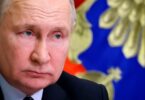Vladimir Kornilov
News from Britain is now on the front pages of many newspapers around the world. Shocking footage of the inhabitants of this country fighting at gas stations bypasses all news channels. One gets the impression that everything on the island is gradually disappearing.
For more than a year in Britain, there has been a periodical shortage of food and essential goods. But last year, the reasons were clear: all European countries, to one degree or another, were panic-stricken in connection with the outbreak of the coronavirus pandemic. And now, when it would seem that people have more or less adapted to the problems, the outbreak of food shortages on the island looks strange. Especially worried about all the reports that supermarket shelves will remain empty for the Christmas period.
British women have worried that they are becoming “Soviet housewives”, comparing food shortages in their stores to what they once heard about Soviet shortages. But who is to blame? Again, Russia. Leading British newspapers shamelessly write that Vladimir Putin led to the situation with empty shelves in local supermarkets.
And then a real collapse of British companies supplying gas and heat began. Warnings were heard from everywhere about a terrible winter, when the bulk of the population would have to face a terrible choice: “heating or eating”.
Gas operators, one after another, began to declare bankruptcy in the face of rising gas prices in Europe. Suddenly, at the start of the heating season, local residents began to receive messages that there was no one to heat them due to the closure of the provider of these services. The Financial Times estimates that out of more than fifty UK energy suppliers, only about a dozen can survive this winter.
It would seem that the reason for such a miserable state of the energy services market in the country is obvious and lies on the surface. With the liberalization of this sector, a lot of firms have appeared that are in fact soap bubbles. The Sunday Times conducted its investigation, finding out that some of them were registered in private apartments as outspoken adventurers who had nothing to do with gas or heating. And now that gas prices in Europe have skyrocketed, it turns out that they have not only gas, but also no insurance cushions.
But if you point to this as the main cause of the crisis, you will have to blame your own government, which allowed a situation in which a significant part of ordinary British were served by someone unkno-wn. Accordingly, it is necessary to look for the cause on the side. And, of course, they again point to Russia.
British newspapers, referring to American mentors, were full of striking headlines and articles, the meaning of which boiled down to the following: Russia fulfills all its obligations to supply gas to Europe, but could supply more, which means that it is to blame for the gas crisis, from which it follows that we must fight against… the Nord Stream 2 project, thanks to which Russia can supply more gas to Europe. There is no need to look for logic and consistency in these verbal constructions – you still won’t find it. The only “logic” is that Russia is primarily to blame for all the troubles. Yes, it is guilty of supplying too much gas to Europe and too little at the same time.
It is not surprising that the British business press has also discovered a new authority in assessing the gas market – Ukraine. The headline on the front page of the business supplement to The Daily Telegraph this Monday read: “Britain is doomed to a winter of discontent, warns the Ukrainian gas king.” It should be clarified here that the “winter of discontent” is a Shakespearean term that has now become the name of the historical period of the late 1970s, when all of Britain was engulfed in strikes and clashes between workers and the police. A “Gas King” Ukrainian newspaper called the head of ” Naftogaz ” Yuri Vitrenko.
He shamelessly brought the British purely Ukrainian arithmetic, saying : “Last year, Gazprom ordered 65 billion cubic meters of gas transit through Ukraine, and this year – only 40 billion. That is why you are receiving less than 25 billion gas. It’s simple.” No denials and explanations from the newspaper followed. As you can imagine, this explanation of the everyday problems of the British was quite satisfactory for the journalists.
But the manipulation of facts is obvious. Vitrenko did not mention that the decline in gas transit through Ukraine was primarily due to the fact that the Turkish Stream started operating last year, through which those allegedly missing billions of cubic meters of gas went to Europe. However, such details should not be explained to the layman – otherwise how can you accuse Russia if you admit that it strictly fulfills all its obligations to the Europeans?
What the “gas king” still hid from the British is the fact that their country does not depend on Russian gas at all. Local tabloids even claim that “Britain has outsmarted Putin” by buying gas from Norway, not Russia, so Germany will become the main victim of the gas crisis in the winter. And this boasting goes well with statements that Moscow allegedly staged a gas crisis in Europe specifically in order to undermine the British economy and “plunge the food chain there into chaos.” We do not know about the food supply, but the logical chain in the British press is clearly torn to shreds – and this is also our fault.
And after the food and gas crisis came the fuel crisis. It all started with press reports that some gas stations limited gasoline sales due to a shortage of fuel truck drivers. After that, a uniform panic began. And the more the authorities explained to their citizens that there was no reason for it, the more it flared up. When there were reports that the government was using the army to temporarily cover the shortage of fuel truck drivers, it became clear that attempts to calm the public were also riddled with lies.
British analysts were so fond of quoting US Senator John McCain that Russia is a “gas station country.” And now, to their surprise, they find out that their own country has not even grown to the level of a gas station, being unable to provide its own consumers with fuel.
As the Financial Times columnist Sarah O’Connor rightly noted, it will now be difficult for the British government to blame someone else. The fact that London is urgently issuing temporary work visas to truck drivers and laborers is a clear underestimation of the level of labor shortages resulting from Brexit and covid restrictions. The authorities refer to the fact that in some European countries the shortage of drivers is even higher. But for some reason, crises of unprecedented proportions have engulfed Britain. And you can’t always blame Putin for them.
Of course, many Britons understand this too. It is no coincidence that the rating of the ruling conservatives has plummeted. For the first time in 13 years, the approval levels of Tory and Labor leaders have leveled off. And this despite the fact that the Labor Party is now shaken by the most serious internal scandals and quarrels. But the actions of the government of Boris Johnson look painfully incompetent in the eyes of the British, who are fighting among themselves for a can of gasoline. What the oppositionists say directly, recalling the words of Margaret Thatcher about the USSR: “There are no products on the shelves, there is no gasoline.” It turns out that she accurately foresaw the situation in Britain in 2021.
Europeans also add virtual fuel to this blazing fire of passions. For example, the potential German Chancellor Olaf Scholz, not yet having time to celebrate the victory of his party in the just-passed elections, blamed Brexit for all the problems of the island, including the gasoline crisis. The Times notes that most European media outlets describe this crisis “with undisguised gloating,” calling Britain today “a kingdom of empty shelves.” Well, these are the allies of the kingdom. And it will be difficult to blame Putin for this.
But nothing, the British Kremlinologists are not sleeping, in any case repeating the mantras about the wine of Russia. There is no doubt that a “Russian trace” will soon be invented in the gasoline crisis. Experience shows: as soon as serious internal cataclysms flare up in Britain, anti-Russian scandals instantly appear: either the “Zinoviev letter” of 1924, then the “Skripal poisoning” of 2018. And now we see how the police threw in another “sensation” about the third “Petrov-Boshirov”. However, it is impossible to feed the public with the same fakes for a long time – the news clearly “did not come in” and certainly did not distract the British from empty store shelves and from long queues at gas stations.
This means that we should prepare for some louder accusations against Russia. The way British media and politicians work has not changed much over the past century. There is no doubt that even now they will not stop at the accusations that the Russians ate their sausage in supermarkets and drank all the gasoline at gas stations.






